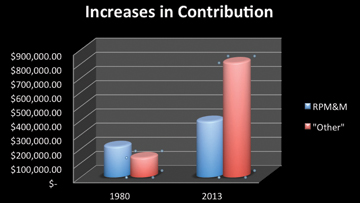You have free articles remaining this month.
Subscribe to the RP Witness for full access to new articles and the complete archives.
The plot of the classic movie It’s a Wonderful Life centers on the desire of George Bailey to never have been born. Through a mistake by his uncle, he faces the possibility of financial ruin and even arrest. In comparison to his brother, who was awarded the Presidential Medal of Honor, and other friends, who had significant roles in World War II, George seems to have accomplished nothing. Thus his desire to never have been born. His guardian angel is able to grant that request, and we see a prosperous Bedford Falls turned into a sleazy Pottersville, his brother dying in a drowning accident as a child, his wife living as a scared spinster, his uncle in an asylum, and other lives negatively affected by his never having been born.
One wonders: What would be the result if we did not have RP Missions and Ministries (RPM&M) and the denominational assessments? Could we see much difference?
RPM&M and Assessments
RPM&M is the discretionary fund that Synod uses to supply various ministries and missions of the denomination. The money comes from voluntary contributions by congregations, individuals, missionary societies, and bequests. The assessment fund is a 2% assessment on each of the congregation’s non-designated receipts. It is used to cover the costs that are necessary to fulfill our obligations as a denomination as described in our Directory for Church Government and elsewhere. It includes things like costs of Synod meetings, study committees, interchurch relations, and pensions.
Why This Question?
In the last several decades, the amount of money being contributed to RPM&M has increased slowly while the category “giving to other RP works” has increased dramatically. For instance, in 2013 approximately $396,000 went to RPM&M compared to $810,000 to “other RP giving.” This compares with $218,053 in 1980 going to RPM&M (previously called “Synod’s Budget”) and $139,186 being contributed to “other RP works.” In light of this, why not simply do away with RP M &M/assessment and let each congregation determine its own priorities in giving to denominational causes? What would change?
The RPCNA Without Assessments
The one thing that would not change would be the Treasurer’s Office. The salaries and other costs come from an overhead charged to those who use their services. This would remain unchanged. If we were to do away with the assessments, there would need to be another way found to pay for meetings of Synod, especially the travel fund, synod judicial commissions, interchurch expenses fraternal delegate costs and chaplaincy costs, costs for dockets and digests, Minutes of Synod, youth ministries, graduate study, Geneva Corporators, Church History Committee, as well as pensions. For 2014, the Pension Board is slated to receive $100,000 in assessments. Without this, I would expect that the Pension Board would need to take some overhead costs from each person paying into the Pension Board. The next largest cost is Synod travel, which I suspect would end up being borne by congregations. Some of the other programs might be severely restricted or need to be eliminated.
The RPCNA Without RPM&M
The elimination of RPM&M would have differing effects on the various boards and agencies depending on other income they might have. Geneva College is probably the least dependent (in terms of percentage of income) of any denominationally supported activity. Yet, it is scheduled to receive $119,000 in 2014 from Synod. I do not know enough about the operation of the college to know where they would make such cuts, but I imagine that the scholarship program would likely be hurt. The RP Home is scheduled to receive $82,000, without which they might cut benevolent care or staffing, both of which would be difficult for the Home. Education and Publication is to receive $89,000 without which they might eliminate the Witness and make some other changes (eliminating some publishing projects or charging for services such as maintaining the denominational website).
For the Home Mission Board to deal with the $89,000 cut, it would have to slow down the rate at which it supports new church plants (from their target for two every year to one per year or maybe even one every other year). Global Missions is to receive $60,000 in 2014, without which it would slow its effort to look at a new mission field. Without the $35,000 earmarked for the East Asia Commission, it would essentially cease all activity, since it gets an overwhelming percentage of its funds from Synod. The RP Seminary is scheduled to receive $72,000 from RPM&M. Without these funds, I am not sure what they would do (e.g., freeze salaries, reduce scholarships to students, etc.), but they would have some tough choices to make.
The Conclusion
The funding received through the denominational assessment and RPM&M does significantly impact the overall denominational efforts. Although you may not think that your individual donation or your congregation’s small assessment makes much of an impact on the work of the broader church, the combined resources form a helpful support of the work as it is ongoing. The Trustees of Synod strongly encourage each congregation to place RPM&M in the congregation’s yearly budget and also to participate in the One Day Great Day of Sharing in November.
God has been using our gifts to do some marvelous things. Similar to what George Bailey discovered, each person and congregation touches so many ministries. Without your gift, there’d be an awful hole.
—Bill Roberts
Bill Roberts is pastor of the Terre Haute, Ind., RP Mission Church and is president of the Board of Trustees of the RPCNA Synod.


